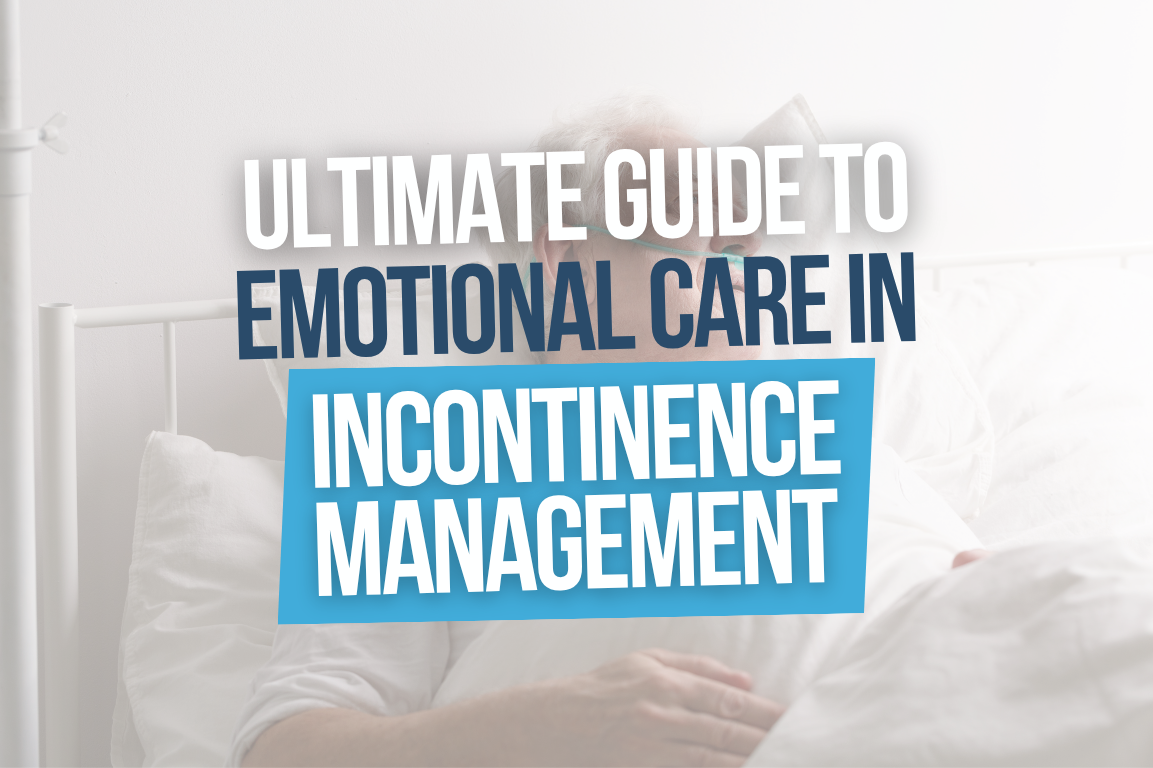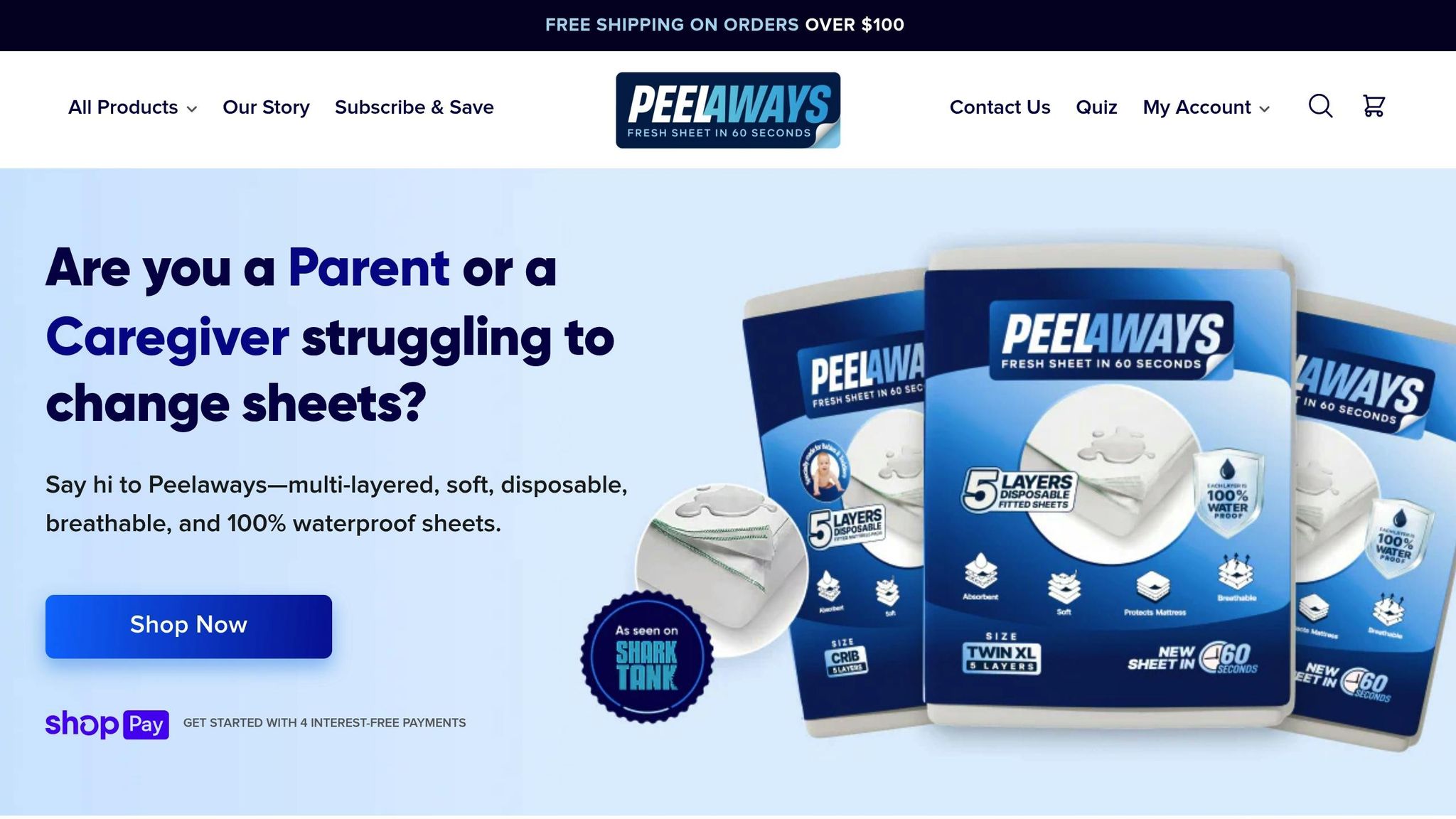Ultimate Guide to Emotional Care in Incontinence Management

Living with incontinence goes beyond physical challenges - it deeply impacts emotional well-being. Anxiety, shame, and social withdrawal are common struggles for individuals, while caregivers often face stress and burnout. Addressing these emotional effects is just as important as managing physical symptoms.
Here’s what you need to know:
- Incontinence and Mental Health: It can lead to constant worry, disrupted sleep, and isolation, affecting confidence and relationships.
- Caregiver Challenges: Emotional strain, physical demands, and lack of support can lead to burnout.
- Support Strategies: Open communication, professional counseling, support groups, and tools like PeelAways sheets can ease the emotional and physical burden.
- Practical Tools: Products designed for convenience and dignity, like disposable bedding, reduce stress for both individuals and caregivers.
The key takeaway? Combining emotional care with practical solutions fosters better outcomes, dignity, and peace of mind for everyone involved.
Leah Fullegar - Smells, Mess & Presents: The Role of Poo in Care Team Dynamics (Incontinence Care)
How Incontinence Affects Mental Health
Incontinence doesn’t just impact the body - it also takes a heavy toll on mental health. While the physical symptoms are often visible, the emotional struggles tend to stay hidden, quietly chipping away at a person’s confidence and overall well-being. Addressing these psychological effects is just as important as managing the physical aspects, as they can profoundly shape a person’s quality of life.
Living with incontinence often means being on constant high alert. People may find themselves obsessively planning their day around bathroom access, restricting fluid intake, or overthinking social plans. This relentless vigilance can drain energy and rob life of its simple joys.
The unpredictability of accidents adds another layer of stress, feeding into a cycle of anxiety that disrupts sleep, clouds decision-making, and makes it difficult to stay fully engaged in everyday moments.
Common Emotional Responses: Shame, Anxiety, and Social Withdrawal
Shame is one of the most common emotional responses to incontinence. Many people grow up equating bladder and bowel control with maturity and cleanliness. Losing that control - even for medical reasons - can feel like a personal failure, sparking deep embarrassment and a sense of regression.
This shame often shows up in subtle behaviors. People might become overly conscious of their posture, adjust their clothing to hide potential accidents, or meticulously plan restroom visits to avoid mishaps. These behaviors can be exhausting and isolating.
Anxiety frequently follows. What may start as a fear of accidents can snowball into broader worries about being judged, facing professional setbacks, or straining personal relationships. Many describe living with a constant sense of dread, as if their body could betray them at any moment.
Unfortunately, this anxiety can create a vicious cycle. Stress often worsens incontinence symptoms, which in turn heightens anxiety, further increasing the risk of an accident. This interplay between mind and body highlights the need to address emotional health as part of incontinence care.
Social withdrawal is another common outcome. To avoid embarrassment, some individuals may start saying no to invitations, skipping trips, or staying away from activities they once loved. Over time, these choices can lead to significant isolation. What might begin as a single missed event can snowball into a pattern, shrinking someone’s social world. Friends and family may not even realize what’s happening, mistaking the avoidance for unrelated excuses when, in reality, fear of incontinence is driving the behavior.
Effects on Personal Relationships and Daily Activities
The emotional strain of incontinence doesn’t stop with the individual - it often spills over into personal relationships. Intimate partnerships can be particularly affected, as worries about accidents, odors, or self-image make physical closeness more complicated. These concerns can make open communication difficult, leading to misunderstandings or emotional distance between partners.
Caregiving dynamics can also shift dramatically. When one partner becomes a caregiver, the person needing help might feel like a burden, while the caregiver may struggle with the added responsibilities. This can create tension and feelings of resentment on both sides.
Parent-child relationships face their own set of challenges. Adult children stepping into caregiving roles for their parents may experience a role reversal that feels awkward or uncomfortable. Meanwhile, parents might resist help out of embarrassment or denial, further complicating an already delicate situation.
Daily life also requires significant adjustments. Simple outings often demand careful planning, from identifying nearby restrooms to carrying supplies and timing activities around bathroom schedules. Spontaneity is replaced by detailed preparation, making even small tasks feel overwhelming. Work environments can be especially tricky, with frequent bathroom breaks drawing attention and business travel adding stress due to long flights or packed schedules.
Sleep is another area that often suffers. Nighttime accidents can lead to disrupted rest, multiple bedding changes, and anxiety about future incidents. Even partners can feel the ripple effects, as their sleep is often interrupted too. Over time, this lack of rest can take a toll on both physical and mental health.
All of these challenges can leave individuals feeling like they’ve lost a part of themselves. Many describe a sense of identity loss, no longer seeing themselves as the confident professional, adventurous traveler, or carefree friend they once were. Coming to terms with this shift can take time, and for many, professional counseling becomes an important part of the healing process.
Acknowledging these mental health impacts is a crucial step in addressing incontinence. By understanding the emotional toll alongside the physical symptoms, it’s possible to create a more complete and compassionate approach to care.
How to Communicate with Respect and Sensitivity
Talking about incontinence requires a mix of honesty and compassion. These conversations can either pave the way for understanding and support or make someone retreat further into discomfort. With around 25 million adults in the U.S. dealing with urinary incontinence, this topic is more common than most people realize [1]. Still, the stigma surrounding it often makes these discussions feel awkward or even taboo.
The key is to create a safe, respectful environment where the person feels in control. This means approaching the subject with care, while also acknowledging the natural awkwardness of discussing such personal matters. Here’s how to navigate these conversations thoughtfully.
Starting Difficult Conversations About Incontinence
The first few moments of any conversation about incontinence are crucial. Acknowledging the discomfort and showing empathy can set the right tone.
- Address the awkwardness upfront. Saying something like "I know this isn’t the easiest thing to talk about, but..." helps ease tension. It shows you understand their feelings and aren’t judging them for being embarrassed.
- Ask open-ended questions. Instead of making assumptions, invite them to share what they’re comfortable with. For example, "Is there anything related to bladder or bowel health you’d like to talk about?" or "What kind of support would be most helpful for you?"
- Offer help when you notice a need. A simple observation like "It seems like you’ve been handling this alone. Is there any way I can support you?" shows you care and have been paying attention.
- Pick a relaxed setting. Conversations about sensitive topics often feel less intimidating in informal, side-by-side settings rather than face-to-face.
- Use natural conversation starters. An article, pamphlet, or even a commercial can make the topic feel less personal and easier to approach.
- Match their language. If they say "pee" instead of "urine", mirror their word choice. Using familiar terms helps keep the tone comfortable and relatable.
Once the conversation begins, the focus should shift to building trust.
Creating Trust Through Understanding
Trust comes from making someone feel genuinely heard and understood. This goes beyond listening - it’s about recognizing the emotions and concerns behind their words.
- Reassure them they’re not alone. Let them know incontinence is a common issue and that there’s help available. Framing it like any other health condition - manageable with the right support - can ease feelings of shame or isolation.
- Be informed before you start the conversation. Knowing about treatments and local resources shows you’re serious about helping. Offering printed materials they can review privately gives them control over how much they want to engage.
- Respect their pace. Some people need time to process before they’re ready to talk or seek help. Let them know the conversation can continue whenever they’re ready. Saying something like "The door is always open" removes pressure while keeping you approachable.
- Maintain confidentiality. Never share what they’ve told you without their explicit consent. Protecting their privacy reinforces the trust you’re working to build.
- Be patient with defensive reactions. It’s normal for someone to downplay the issue or react defensively at first. Give them space without pushing for immediate solutions.
- Choose private, uninterrupted moments. These conversations deserve full attention. Pick a time and place where you won’t be interrupted, so the discussion feels as important as it is.
The goal isn’t to solve everything in one sitting or push someone toward action right away. Instead, focus on creating a foundation of trust and understanding. When people feel respected and heard, they’re much more likely to open up, seek help, and accept support when they’re ready.
Practical Steps for Supporting Emotional Health
Taking care of emotional well-being plays a crucial role in managing incontinence. While the physical challenges are undeniable, addressing the emotional toll is just as important - for both those living with incontinence and their caregivers.
Studies reveal that 56.6% of women with incontinence experience anxiety tied to their condition [4]. This highlights how common emotional struggles are and underscores the importance of finding ways to cope. Here are some actionable strategies to build emotional resilience for both individuals and their caregivers.
Finding Support Groups and Professional Counseling
Connecting with others and seeking professional help can make a world of difference in managing the stress that comes with incontinence. Approaches like Cognitive-Behavioral Therapy (CBT) and Mindfulness-Based Stress Reduction (MBSR) have proven effective in reducing anxiety related to incontinence [7]. Therapists trained in these techniques can teach strategies to manage fears about accidents or navigating social situations.
Support groups create a safe space to share experiences and gather practical tips. To find these groups, ask healthcare providers - such as urologists, pelvic floor therapists, or primary care doctors - for recommendations. Hospitals and community health centers often offer free or low-cost options as well.
National organizations like the National Association for Continence (NAFC) are also excellent resources. They provide educational materials and directories of both in-person and virtual support groups [6][7]. Similarly, The Simon Foundation for Continence hosts online communities where people can connect from anywhere in the country [7].
For those who prefer online interactions, platforms like private Facebook groups, Reddit communities, and Inspire offer 24/7 peer support. Local resources such as senior centers, YMCAs, and public libraries may also host health-focused groups that are free and easy to access.
When choosing a group, look for one that aligns with your specific type of incontinence. For example, strategies discussed in groups focused on urge incontinence may differ from those addressing stress or functional incontinence, which affects over 30 million people in the U.S. [5].
"It's essential to remember that incontinence is a medical condition - just like any other - and not a reflection of personal inadequacy." – TENA
If a group doesn’t meet your needs or feels unsupportive, don’t hesitate to explore other options. The goal is to find a space that offers real encouragement and practical advice [7].
Self-Care Strategies for Caregivers
Caregivers face their own emotional hurdles when supporting someone with incontinence. The constant worry, physical demands, and emotional strain can lead to burnout if not managed carefully.
Regular breaks are essential. Arrange for a family member to step in for a few hours each week, hire respite care, or join a caregiver support group for advice on managing daily routines. Neglecting personal health - such as skipping meals, losing sleep, or avoiding exercise - can reduce a caregiver’s ability to provide effective support. Maintaining a basic self-care routine helps preserve energy and patience.
Mindfulness practices like deep breathing, short meditations, or mindful walking can help caregivers stay grounded during stressful moments. Setting boundaries is just as important. Knowing when to seek extra help - whether through professional counseling, home health services, or additional support - can prevent feelings of being overwhelmed.
Learning more about incontinence can also reduce uncertainty. Understanding the condition’s medical aspects, treatment options, and management techniques can boost confidence in providing care [2][3].
Caregivers can also benefit from therapy. Professional counseling offers tools for managing emotions like frustration, guilt, or helplessness. Building a support network through friends, family, or formal groups can ease feelings of isolation and stress.
Acknowledging tough emotions - whether they’re frustration, sadness, or anger - is a key step in maintaining emotional well-being [2].
sbb-itb-45288fe
Tools That Reduce Stress and Maintain Dignity
The right products can turn incontinence care into a more manageable and dignified experience. When tools are thoughtfully designed to address both practical needs and emotional well-being, they not only ease the workload but also support the dignity of those involved. Let’s look at how PeelAways tackles these challenges with smart features and practical solutions.
How PeelAways Supports Emotional Comfort

Changing bedding after an incontinence incident can feel like an overwhelming task for both individuals and caregivers. It often involves lifting heavy mattresses, stripping multiple layers, and worrying about cross-contamination - all while someone may feel exposed and vulnerable.
PeelAways disposable waterproof bed sheets simplify this process with their patented 5–7 layer design. Caregivers can simply peel away the soiled top layer, avoiding the need for heavy lifting, cutting down on laundry, and reducing concerns about contamination. This streamlined cleanup process not only saves time but also helps preserve the dignity of the individual during a sensitive moment. Quick and discreet, it minimizes embarrassment and restores a sense of normalcy.
For caregivers, the sheets are made from 100% waterproof yet breathable fabric, offering reliable mattress protection without sacrificing comfort. PeelAways are available in various sizes, from Crib-A-Peel for toddlers at $30.99 to King size at $53.99. The Twin XL option, featuring a 7-layer configuration, is priced at $41.99.
To make things even easier, a subscription option provides 15% off regular orders, ensuring families managing long-term incontinence always have a steady supply - one less thing to worry about.
Selecting Comfortable and Easy-to-Use Bedding
PeelAways goes beyond functionality to address comfort and ease of use. Bedding that feels soft, is chemical-free, and is easy to install contributes significantly to emotional well-being. Familiar textures and breathable materials help maintain sleep quality and reduce disruptions, creating a more comfortable and reassuring environment.
Unlike many alternatives, PeelAways uses soft, chemical-free fabric that avoids the stiff, plastic-like feel common in other disposable options. This thoughtful design helps replicate the comfort of traditional bedding, making the bedroom feel familiar and inviting.
The fitted design ensures the sheets stay securely in place, while the breathable materials help regulate body temperature, further enhancing comfort. These features not only simplify care routines but also reduce the physical and emotional strain on caregivers.
For added convenience, disposable options eliminate the hassle of special washing instructions, while reusable products are built to withstand frequent laundering without losing their protective qualities.
Protecting Caregiver Health and Setting Limits
Caring for someone with incontinence can be both physically and emotionally draining. Without setting boundaries and prioritizing self-care, caregivers risk becoming overwhelmed and unable to provide the consistent support their loved ones need. Taking care of yourself isn’t indulgent - it’s essential for maintaining the energy and focus required for caregiving.
Spotting and Preventing Caregiver Burnout
Burnout often stems from a combination of sleep deprivation, constant worry, and the physical demands of caregiving. Early signs include persistent fatigue, irritability, trouble concentrating, and even feelings of resentment toward caregiving duties. Physical symptoms like headaches, back pain, and frequent illnesses are also common indicators.
This emotional and physical toll can lead to feelings of isolation, anxiety, or even depression. Recognizing these signs early is crucial to addressing them before they spiral out of control. Start by taking steps to protect your well-being and manage your caregiving responsibilities more effectively.
One of the most important things you can do is accept help when it’s offered. Whether it’s a neighbor dropping off a meal, a family member stepping in for a few hours, or hiring professional assistance, building a support network is vital. Many caregivers feel they should handle everything alone, but sustainable caregiving depends on sharing the load.
It’s also important to set realistic expectations for yourself. You don’t need to be available every second of the day or do everything perfectly. Focus on what truly matters - ensuring safety and comfort - and let go of less critical tasks. For instance, it’s okay if the house isn’t always spotless or if some days feel harder than others.
Incorporating personal time into your daily routine is another key step. Even 15–20 minutes spent reading, walking, or chatting with a friend can provide a much-needed mental reset.
Staying Safe During Care Tasks
Caregiving often involves physically demanding tasks like lifting, transferring, or changing bedding, which can put your body at risk if not done carefully. Proper body mechanics are essential to avoid injury. Always lift with your knees, keep your back straight, and hold objects close to your body to reduce strain.
Using tools that lessen physical effort is especially helpful when managing incontinence care. For example, traditional bedding changes can involve heavy lifting and handling soiled linens, which can be both exhausting and emotionally taxing. PeelAways offers a practical solution with its multi-layer design, allowing caregivers to simply peel away the soiled top layer without lifting or excessive effort. This thoughtful design reduces physical strain while maintaining dignity and comfort for the care recipient.
PeelAways’ effectiveness is backed by over 6,000 five-star reviews and an impressive 4.8 average rating[8]. It’s a small but impactful way to make caregiving tasks less stressful. Beyond specific tools, it’s also important to ensure the overall care environment is safe.
Keep pathways clear and well-lit - especially at night - to prevent accidents. Organize supplies so they’re within easy reach, and arrange furniture to minimize unnecessary lifting or movement.
Finally, know when to seek professional help. Tasks like lifting or transferring someone with limited mobility can be risky without proper training. Physical therapists can teach safe techniques, while occupational therapists may recommend adaptive equipment to make daily caregiving tasks safer and more manageable.
Conclusion: Combining Practical Solutions with Emotional Support
Managing incontinence requires more than just practical tools - it demands a blend of effective solutions and emotional care. The key is to address the medical condition while preserving dignity, comfort, and peace of mind for everyone involved.
The right products can ease the burden on both caregivers and care recipients. For example, PeelAways simplifies cleanup, reducing the need for heavy lifting and minimizing the risk of cross-contamination. These kinds of tools not only make daily tasks easier but also alleviate stress, creating a more manageable caregiving experience.
Incontinence doesn’t just affect the individual; its emotional impact ripples through families and caregiving networks. Feelings of shame, anxiety, and social withdrawal can take a toll, making respectful communication and professional support crucial. By fostering an environment of trust and understanding, caregivers can encourage open conversations that break down barriers and allow individuals to seek the help they need. This combination of emotional and practical support builds a stronger, more compassionate care environment.
When practical tools and emotional resources work hand in hand, they help safeguard dignity and ease the challenges of incontinence for everyone involved. Stress-reducing products create room for meaningful connections, while support groups and counseling provide the emotional foundation for comprehensive care. Together, these strategies ensure that both the physical and emotional aspects of incontinence are addressed.
Seeking help - whether through professional counseling, support groups, or practical tools - isn’t a sign of weakness. Instead, it reflects a commitment to holistic care, one that prioritizes quality of life for everyone affected. The goal isn’t just managing symptoms but creating a supportive environment where dignity, health, and relationships can thrive despite the challenges of incontinence.
FAQs
What are some effective ways for caregivers to cope with the emotional challenges of incontinence care?
Caring for someone dealing with incontinence can be challenging, both emotionally and physically. However, there are practical steps you can take to ease the strain. First, don't hesitate to reach out for support. Whether it's talking to friends, family, or joining caregiver support groups, sharing your experiences can help you feel less isolated and may even offer helpful tips from those who understand what you're going through.
It's also crucial to carve out time for yourself. Take regular breaks, pursue hobbies or activities that bring you joy, and focus on your own well-being - both physically and mentally. Having open and honest conversations with your loved one can foster a more understanding and compassionate dynamic. And remember, asking for help or delegating tasks isn’t a weakness; it’s an important step in preventing burnout and maintaining balance.
To make daily care more manageable, consider using tools designed to simplify the process. For example, Peelaways disposable bed sheets are a practical option. Their multi-layer design lets you peel away soiled layers quickly, making cleanup faster and easier while ensuring cleanliness and comfort for your loved one. Creating a judgment-free and supportive environment, paired with these small adjustments, can make a big difference in reducing stress for both you and your loved one.
How can people with incontinence stay socially active and prevent feelings of isolation?
Staying socially engaged while managing incontinence is entirely doable with a little planning and the right mindset. Begin by confiding in trusted friends or family members. Sharing your situation with those close to you can create a sense of understanding and support, which often helps reduce feelings of isolation.
Participating in activities that nurture both your body and mind - like exercising regularly or diving into hobbies you love - can also make a big difference. These not only boost your confidence but also help ease stress. If you find yourself struggling with social anxiety or fear of rejection, reaching out to a therapist might be a good step. They can offer strategies to navigate these emotions and build resilience.
With open communication, a focus on self-care, and emotional support, you can continue to enjoy a rewarding social life while managing incontinence.
How can support groups and counseling improve emotional well-being for those managing incontinence?
Support groups and professional counseling can be incredibly helpful for those dealing with the emotional challenges of incontinence. Support groups create a welcoming environment where individuals can share their experiences, connect with others who understand, and ease feelings of loneliness. Being part of a community like this can help reduce anxiety, shame, and other difficult emotions tied to incontinence.
On the other hand, professional counseling provides tailored guidance to tackle emotional hurdles and maintain mental well-being. Therapists can work with individuals to build coping strategies, boost self-confidence, and enhance their overall quality of life. Together, these resources offer a solid emotional support system, helping individuals face the challenges of incontinence with greater confidence and understanding.
Related Blog Posts
- 7 Essential Tips for Nighttime Incontinence Care
- Study: Impact of Dignity in Incontinence Care
- Why Respect Matters in Incontinence Conversations
- Checklist for Streamlining Incontinence Care Tasks
Comments
0

SAVE MONEY & WATER
Professionals & Institutions save a fortune on labor/laundry.

SUPERIOR COMFORT
The first thing our customers notice is how soft our sheets are.

100% WATERPROOF
Each layer is 100% Waterproof, perfect for spills and accidents

SAVE TIME
Change the sheet in under 1 minute without stripping the bed.




Leave a comment